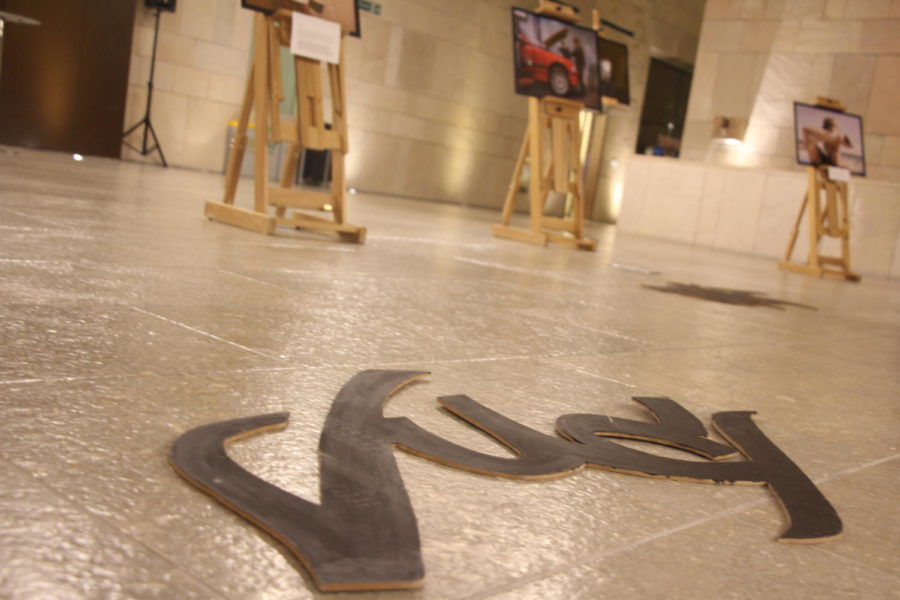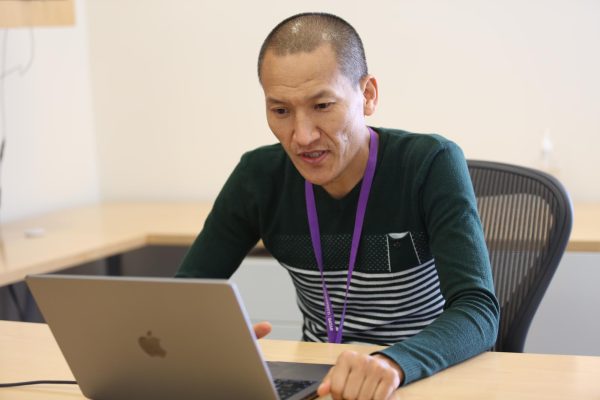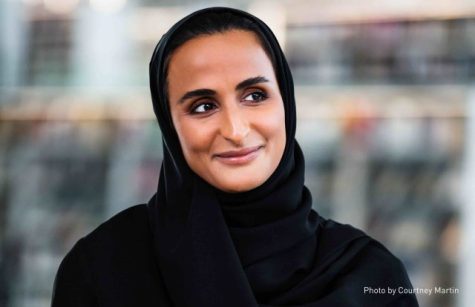GU-Q initiative calls for attention to migrant workers’ rights
Photographs from the Exhibition “Khalouna Nwarikom” [Let Us Show You”] along with the Arabic translation of ‘Justice.’ Photo by Malek Al Manaa.
Ensaniyat aims to raise awareness of the laws protecting migrant workers in countries like Qatar and Kuwait, said Noor Al Sulaiman, Ensaniyat’s Student Outreach Manager, at an event hosted by Georgetown University in Qatar on February 3.
For the past three to four months, Ensaniyat has worked on its first event in Qatar to showcase some of the work produced by Kuwaiti students in a previous exhibition titled “Khalouna Nwarikom” [Let Us Show You], which was first presented in Kuwait.
The exhibition included photography and calligraphy art aimed at capturing different aspects of the lives of migrant workers. The event also featured an independent photographer based in Qatar along with testimonies from migrant workers and the student organizers of the event.
Ensaniyat’s initiative in Qatar comes in conjunction with Qatar’s approval of a new domestic worker, migrant worker and labor law. According to Human Rights Watch, the law was passed on Aug. 22 of last year.
“The purpose [of Ensaniyat] was to explore how their rights played a role in how their journey has been so far,” said Al Sulaiman.
Students from Qatar University, GU-Q, and Cornell University in New York took part in organizing the event. According to the students, Ensaniyat served as a way for them to understand the laws about migrant workers and enabled them to go out and discover the stories of domestic and labor workers as a way to understand their lives in Qatar.
“The initiative of Ensaniyat helped me turn the rosy slogans into actual actions and be part of the change instead of someone who only calls for it,” said Ahmad Younas, one of the students who helped organize the event.
The event featured films produced by the Kuwaiti students of Ensaniyat’s exhibition in Kuwait, one of which was “Kareem,” a documentary that profiled an Indian migrant worker, Kareem, and the life-changing experience he had in Qatar.
Al Sulaiman summarized and translated the documentary for the audience. Kareem came to Qatar as a driver but hoped to find an opportunity to become an actor. He was granted that opportunity by his employer Naif al Malki, who started posting videos of him on Snapchat, which gained popularity as “Kareem Time.”
Juana Manapsal, a domestic worker from the Philippines who has been working in Qatar for the past 11 years, shared her story at the exhibition and called for respect of the sacrifices that domestic workers make to work for their employers.
“At first I was reluctant, but I don’t have any other choice. I’m already here. There is no way of turning back,” said Manapsal. Despite her reluctance to leave her family and move overseas to a country she is not familiar with, Manapsal said she was able to adapt easily and learn quickly.
“Here, I find better opportunities and most of all in this country where I earn the money to support the needs of my kids and sometimes even their wants,” added Manapsal. “I just want to share my story so because not all of us experience like what I do have, so just to give them positive way of thinking. Not all of the people have the same fate, we have our own luck. Just keep on praying and hope for the best.”
The event featured an exhibition of photographs and calligraphy art by students from Kuwait in which they explored the lives of migrant workers in Kuwait and India and called for rights such as freedom and liberty.
“I joined Ensaniyat just to be creative and try to show the humanitarian side of photographers and what they do basically,” said Ali Hussain Kamal, a Kuwaiti marketing graduate and photographer.
Kamal said he aims to raise awareness of these laws to all the people in Kuwait who are not already aware of them, himself included. For him, his photographs serve to capture the conditions of migrant workers that the Kuwaiti legal system aims to prevent.
In one of his photographs, he portrays a teenager and an old man fixing a BMW car in a shop. According to Kamal, this represents that according to the law, 14 year olds and people over 60 should not be working hard labor.
Rashed Sulaiman Al Sulaiman is a Kuwaiti photographer who specialized in taking photographs in India, the home of many migrant workers. “I really tried to show in the best light possible their life, what they come from, what they run away from most of the times, and what they send money home to every day,” he said.
In his photographs, Al Sulaiman focuses on one single act such as selling balloons or a man with a bubble machine to show that, despite these workers’ difficult situations, they sell things that make other people happy.
Although not part of Ensaniyat, the event also featured Aparna Jaykumar, an independent photographer based in Qatar. “I couldn’t help noticing that there were all these men here who were almost invisible. They were building the city they were working in very difficult conditions in the heat but we didn’t even know who they were,” said Jaykumar.
Jaykumar worked with Khalid Al Baih to create Qatar Fashion Fridays, a project she currently runs. The concept of the project is to capture the fashion of migrant workers on Fridays, their day off, as it represents how these workers express themselves.
In her final remarks at the event, Noora Al Sulaiman expressed her gratitude to all those who took part, emphasizing that “this event is not supposed to resemble the end of Ensaniyat’s work, however, the beginning of a more positive future in our region regarding all people’s rights.”
Correction:
The previous version of the story incorrectly spelled the project name as “Insaniyat.” The new version has the accurate spelling of “Ensaniyat.”













